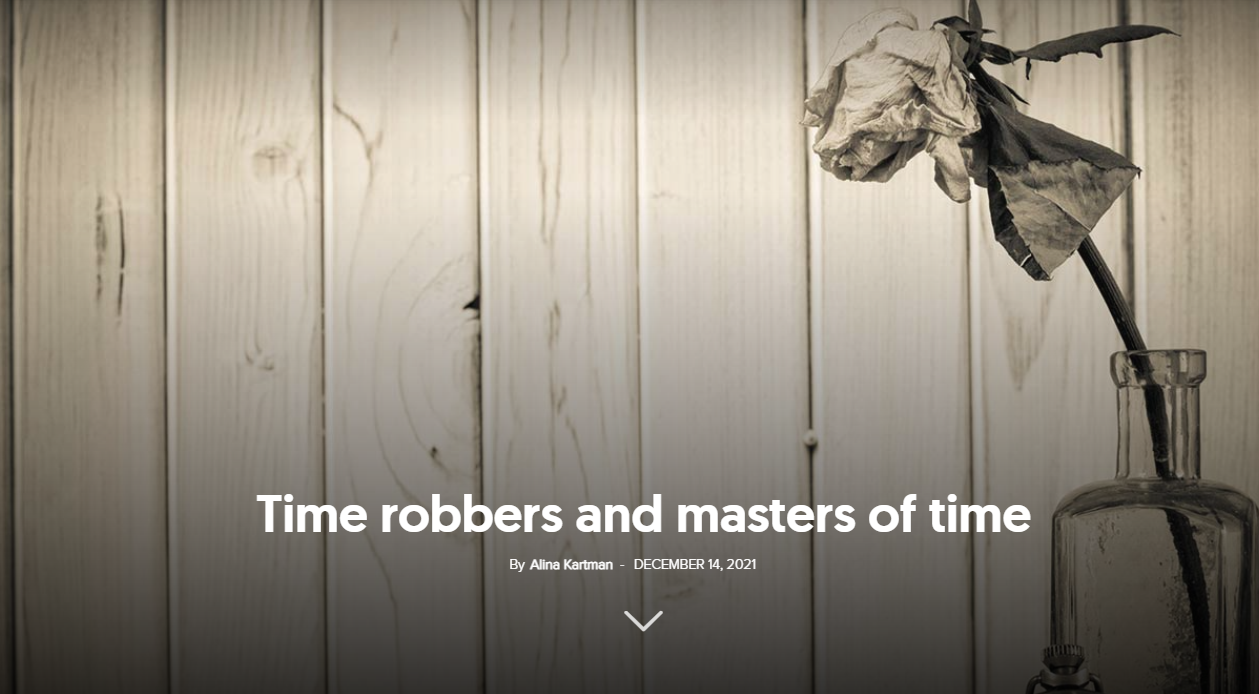Time can exist in many forms—work time, free time, leisure time—and it has a lot of possessive adjectives: my time, your time, our time. The relativity of time can often lead to confusion because of the accompanying mixture of emotions, such as fear, joy, satisfaction, or expectation. It was this relativity of time that led me to need to define it in my own way.
Sometimes even friendships can be stressful. And if we look at Hans Selye’s theory, the first phase of stress can be a positive one. The following lines are the result of such stress.
I have a good friend with whom I get along admirably. For a while, our discussions took a somewhat awkward direction for me, and eventually became really stressful. “What else did you do in your free time?” It initially sounded like a question simply out of curiosity. But when the question began to appear in every conversation, the absence of an answer became embarrassing and awkward.
I tried to come up with a “Why are you asking?”, but my friend didn’t give up. She listed the benefits of leisure as a protective factor against the unwanted effects of stress, from my physical to my emotional well-being. She was worried, so I became worried about the gloomy implications in front of me. Alarmed, I looked back on the previous few days, analysing every hour, looking for the precious deposits of free time.
I was amazed to discover the great deficit up to that point, wondering how I survived so far with so many gaps when it came to my spare time. Have I exhausted my resources of good and beauty without realizing it? Have I lived my life unfulfilled and unsatisfied all this time without knowing it? Where did I lose my free time or, following Lavoisier’s theory, what did it turn into?
The answer came to me in the form of an incident that took place in the pre-COVID era, when most of us allowed ourselves to go on distant and extended vacations.
Everyone in our family of four loves nature, in its many forms. The mountain always gets four votes, while the sea only gets three—that is, without my vote. Just the thought of the millions of peculiar creatures swarming in the water when I swim is enough to make me change my mind. It is my misfortune that I belong to a democratic family and I lost the vote when it was decided where we should go in our free time.
The good weather made all three enemies spend most of their time in the water, while I stayed behind to watch over the sunscreen and umbrella, on the beach. After a few days, I voiced my dissatisfaction and asked that minority opinions be taken into account, as my free time was also at stake. The generous jury unanimously decided to grant me a veto, and I was empowered to decide how we would spend the next vacation days. There were many options which did not involve the sea and I had plenty to choose from.
Now our free time would revolve around my free time, with the absolute power to direct its course. The next day, after much analysis and investigation, I calmly announced my destination: we were going to the sea. And the next day we went to the sea again, to the delight of the little ones. As long as going to the sea was the result of my choice, I was completely satisfied.
I chose to let them enjoy what they liked best, and their joy was reflected in me. I did not murmur and I did not become a victim sacrificing for the common good. In the end, I went into the water with them, swimming happily among the molluscs and crustaceans. The power of making decisions can change the course of time from negative to positive.
Looking for a definition of time
Time can exist in many forms—working time, free time, leisure time—and it has a lot of possessive adjectives: my time, your time, our time. The relativity of time can often lead to confusion because of the accompanying mixture of emotions, such as fear, joy, satisfaction, or expectation. It was this relativity of time that led me to need to define it in my own way.
Time is a unit from which we cut slices every year. Some thicker, some thinner in terms of achievements.
Years of school, career advancement, or starting a family—deep down in each of us is the fear that one day we will run out of time. And we try to manage it well, taking it from one place and putting it in another, measuring, sometimes too accurately, how much we set aside for ourselves and how much we give to others.
Time can also be fragmented into days, being divisible by seven in its most common formula. When we break the seventh day of the week into five loaves and two fish, feeding the needs of others, we experience again the wonder of multiplying good inside ourselves. We grow and, with each bite, we begin to satisfy our own hunger for the absolute.
Time can behave like gas, taking the form of any vessel in which it is placed. It can turn into money, material things, or even people. The more important they are, the longer the time transfer. Character is the safest recipient of time. It has, of course, the largest volumetric capacity, but the final results are beyond this reality.
Time can sometimes become liquid. A few days ago, it started dripping on my thoughts, oozing into a sea of worries, right at my feet. I tried to swim amidst anxiety and fear, struggling to keep my head up above my worries. I fidgeted and cried, ready to drown. In the midst of the storm, I heard His voice: “Quiet! Be still!” And the sea of time was flattened out. I looked at Him, the One beyond time.
I looked at myself, the one with the pockets full of me, thick and heavy, ready to drown me. He lifted me up from my helplessness. He took my hand. He put His time in it, pulsating with life and stretching to infinity, like a lifeline tied to the bridge of heaven.
Resolution
I let too much of my time play relativity, moving from one phase to another, from one person to another, undecided as to where it belongs. When I received His time, I did not have room for my time. I threw it away without regret. From then on, I began to unwind the promise of eternity, thought after thought, minute after minute. And give us today our daily time, so that we can break it with those in need, just as You have always broken it with us.
Denisa Selagea writes from Australia about how we can and must change our focus, clarifying the way we define time.




















